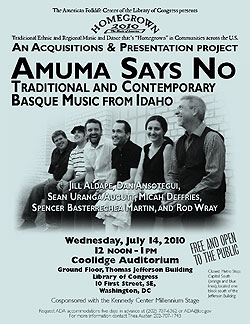| |
|||
|
The American Folklife Center at the Library of Congress presentsThe Homegrown 2010 Concert Series
|

|
“Culture Lives with Change.”
Dan Ansotegui, co-founder of Amuma Says No
Basque music arrived in Idaho with Basque immigrants in the 1890s. The main musical instruments they brought were the trikitixa (button accordion), pandero (tambourine), harmonica, and guitar. All of them were small, portable, and fit for the long journey across the Atlantic. Many of today's musicians can tell stories of their parents or grandparents playing music in the local boarding-houses during the winter months, far from the mountains where they herded sheep.
The first Basque bands played for the monthly dinners at the Basque Center, for the annual Sheepherders' Ball, and for dances in the Frontón on Boise's Grove Street. In 1957, the late Basque accordionist Jim Jausoro formed his first band with Domingo Ansotegui — Dan's and Gina's father — playing the pandero and drums. A saxophone and a trumpet completed the four-piece group. Jimmy's band, as it was known in the community, played a repertory of Basque jotas and porrusaldas mixed with popular tunes from the 1940s and 50s.
Starting in the 1960s, two main bands were formed in Boise. Jim Jausoro founded Ordago, to play Basque standards and popular music from the 1960s and 70s. After Ordago broke up, the folk band Gaupasa was formed. Both bands included musicians of a second generation of American Basques such as Dan Ansotegui on the trikitixa, Sean Aucutt on the pandero, and Patty Miller on the guitar, among others. All of these Boise-based bands had broad regional audiences in Idaho, Nevada, and California Basque communities.
For several years after Gaupasa separated, Dan and Sean talked about forming another band that would play a Basque repertory with a new sound. That was the beginning of what is today's Amuma Says No, — ASN — a six-piece band with a unique sound. ASN's founding members are Dan Ansotegui, on the trikitixa, Sean Aucutt, on the pandero, and Jill Aldape, vocals. Spencer Basterrechea Martin on drums and txalaparta (a wooden percussion instrument) joined them next, followed by Rod Wray on the guitar and Micah Deffries on the bass. Amuma Says No arranges Basque music for a unique mix of Basque and American instrumentation and rhythm. As it innovates on tradition, ASN creates the new sound they believe represents the esthetic of their community of American Basques in the Western United States. "So far, all of our music comes from the Basque country," says Dan. "It's definitely a compliment when someone says we sound like the bands from over there, but it is not our goal. We want it to sound like us doing their song." he adds.
Most of the band members are integrated into the cultural life of their community, as practicing dancers, musicians, and instructors. Amuma Says No founders have danced with the group Oinkari since their teenage years. Dan was one of the co-founders of a liturgical male dance group that participates in the Celebration of St. Ignatius Feast at Boise's St. John's Cathedral. A few years ago, Gina Ansotegui Urquidi and Dan Ansotegui founded Txantxan Gorriak, a Basque music school, where Dan and Sean teach trikitixa and pandero, and, recently, Spencer Basterrechea Martin started teaching the txalaparta.
Maria Carmen Gambliel
Folk & Traditional Arts Program
Idaho Commission on the Arts
 The American Folklife Center was created by Congress in 1976 and placed at the Library of Congress to "preserve and present American Folklife" through programs of research, documentation, archival preservation, reference service, live performance, exhibition, public programs, and training. The Center includes the American Folklife Center Archive of folk culture, which was established in 1928 and is now one of the largest collections of ethnographic material from the United States and around the world. Please visit our web site.
The American Folklife Center was created by Congress in 1976 and placed at the Library of Congress to "preserve and present American Folklife" through programs of research, documentation, archival preservation, reference service, live performance, exhibition, public programs, and training. The Center includes the American Folklife Center Archive of folk culture, which was established in 1928 and is now one of the largest collections of ethnographic material from the United States and around the world. Please visit our web site.
| ||||
